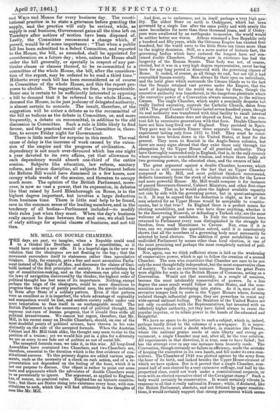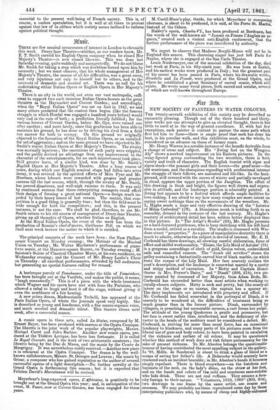MR. MILT, ON DOUBLE CHAMBERS.
TREdaYs are past, we imagine, when a Republic could send to a thinker like Bentham and order a constitution, as it would have ordered a new rifle. It is a hopeful sign in the new re- volution that the idealogues are not floating to the top ; that the movement surrenders itself to statesmen rather than speculative thinkers. Italy, for example, gets a free and most anomalous Parlia- ment instead of the Rights of Man, and discusses the claims of Gari- baldi instead of the first principles of society. It is nevertheless the age of constitution-making, and as the statesman can pilot only by the laws of navigation discovered by the thinker, the highest order of political thought has lost none of its importance. Nothing, except perhaps the reign of the idealogues, could be more disastrous to progress than the sway of purely practical men, the servile imitation by State after State of a solitary pattern. Even if that pattern were as excellent as it is imperfect, the whole advantage of orginality and comparison would be lost, and modern society suffer under one more temptation to fuse itself in an unchangeable mould. The British Parliament is not the necessary end of political thought, the supreme out-turn of human progress, that it should thus stifle all political inventiveness. We cannot but regret, therefore, that Mr.
in his recent essay on Double Chambers, should, on one of the most doubtful points of political science, have thrown in his vote distinctly on the side of the accepted formula. When the Austrian Cabinet and Mr. Mill think alike, the thought may seem to rise to the position of a truism ; yet we would fain put in a plea for a diversity we are as sorry to see fade out of politics as out of social life.
The accepted formula runs, we take it, in this wise. All long-lived Assemblies have contained two Chambers, and two Chambers are, therefore, essential to the duration which is the first evidence of con- stitutional success. To this primary dogma are added various argu- ments, such as the necessity of a check on rash action, and of a re- presentation not dependent on the feeling of the hour, which it is not our purpose to discuss. Our object is rather to point out some facts and arguments which the advocates of double Chambers seem to us persistently to ignore. The argument, as applied to England, has, of course, no practical value. England has an historic constitu- tion; but there are States rising into existence every hour, with con- stitutions to seek, which they will find ultimately in the thoughts of men like Mr. Mill. And first, as to endurance, not in itself perhaps a very high qua-, lity. The oldest State on earth is Oodey pore, which has been governed by a single line after the same polity and with nearly the same boundaries for more than three thousand years, and if Oodey- pore were swallowed by an earthquake to-morrow, the world would be neither better nor worse. Athens remained a free Republic only a hundred and fifty years, while the Ottoman Empire has existed four hundred, .but the world owes to the little State ten times more than to the mighty dominion. Still, as a mere matter of historic fact, the governing bodies which have endured the longest have not con- tained double Chambers. Nothing now in existence has had the longevity of the Roman Senate. That body was not, of course, elected, but it was in a very high degree representative, never having been for any long period in disaccord with the governing classes of Rome. It ended, of course, as all things do end, but not till it had remoulded human society. Men always fix their eyes on individuals, and the lurid glare which surrounds the Caesars blinds us to the fact that the Senate retained vast powers under the Empire, that the work of legislating for the world was done by them, though the executive authority was transferred, in the dangerous plenitude which the executive power of a Convention always assumes, to the military Caesars. The single Chamber, which under a nominally despotic but really limited executive, controls the Catholic Church, dates from 1274. The great Council of Venice lasted seven hundred years, though its real authority was transferred with fatal facility to small internal committees. Endurance does not depend on form, but on the con- tent felt by successive generations with that form. Double Chambers have not been long-lived out of England. They perished in Spain. They gave way in modern France three separate times,, the longest experiment lasting only from 1831 to 1848. They must be consi- dered to have broken down in the United States, at least for the present. They seem to flourish in the Anglo-Saxon colonies, but there are many signs abroad that they exist there only through the abnegation by the Upper House of all practical authority. They have thoroughly succeeded only in England, that is, in the only country where compromise is considered wisdom, and where there really are two governing powers, the educated class, and the owners of land.
The great argument against a double Chamber, however, which seems to us still unanswered, is the fact that an Upper Chamber composed as Mr. Mill, and most political thinkers recommend, deducts immensely from the stock of wisdom available for the Lower and more powerful House. Mr. Mill would compose it for instance of passed Governors-General, Cabinet Ministers, and other first-class notabilities. That is, he would place the highest available capacity not side by side with the governing power, but in quasi-antagonism to it. It may be argued that the deduction is slight, as few of the men selected for an Upper House would be acceptable to constitu- encies, but is that true ? In England there is a perfect mania for electing notabilities, and men who have done anything, whether it be the discovering Nineveh, or defending a Turkish city, are the most welcome of popular candidates. In Italy the constituencies have returned to Parliament every man distinguished in the struggle for freedom, from mad Mazrinians to Cavour. Nor, even if it is true, can we consider the question solved, until it is conclusively shown that all the members of a governing body must necessarily be selected by local electors. The addition of great notabilities to an undivided Parliament by means other than local election, is one of the most promising and perhaps the most completely untried of poli- tical experiments. Nor, again, can we think sufficient stress is laid on the weakening of conservative power, which is apt to follow the creation of a second Chamber. The men who constitute that Chamber are sure to be not only the most thoughtfully independent, but the most conservative class of society. To take an extreme instance. Suppose the great Peers were eligible for seats in the British House of Commons, acting as a Convention. Would not that assembly, in a couple of sessions, become the most intolerably conservative of powers. In a less degree the same result would follow in other States, and the com- munities now rapidly developing into states. As it is, men of con- servative temper look to seats in the Upper Houses where, forming isolated though influential groups, they are powerless to resist any wide-spread national feeling. The Senators of the United States are not only co-ordinate with the Representatives, but invested with an infinitely higher authority, yet they have failed always to resist the popular impetus, or to retain power in the hands of the educated and thoughtful.
We have no space to do justice to such a subject, which is, indeed, perhaps hardly fitted to the columns of a newspaper. It is impos- sible, however, to avoid a doubt whether, in countries like France, where the national genius needs at once liberty and strong go- vernment, a single Chamber may not, after all, be the true solution. All experiments in that direction, it is true, seen to have failed; but has the attempt ever in any one instance been honestly made. The Convention, though certainly no failure in efficiency, made the mistake of keeping the executive in its own hands, and fell under its own com- mittees. The Chamber of 1848 was plotted against by the army from the hour of its birth, and lacked besides the Upper House element of which we have spoken. But is it proved that a single Chamber, com- posed half of men elected by a very extensive suffrage, and half by the propertied class, could not work under a constitutional emperor, or even with an elected executive chief of the Cavaignac stamp ? Such a body would certainly be conservative. It would certainly vibrate in response to all that is really national in France ; while, if declared, like the British Parliament, absolute, and not fettered by paper constitu- tions, it would certainly support that strong government which seems
essential to the present well-being of French society. This is, of course, a useless speculation, but it is well at all times to protest against that law of la cliiture which society seems inclined to enforce against political thought.































 Previous page
Previous page